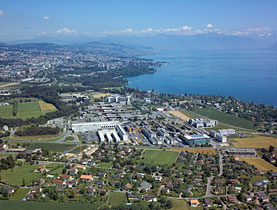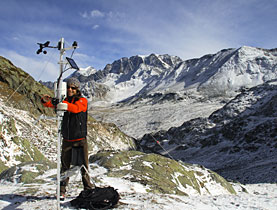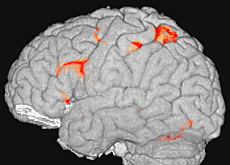EPFL and firms search for Next Big Thing

The list of big firms that have signed partnership deals with Lausanne's Federal Institute of Technology (EPFL) continues to grow.
On Thursday mobile phone giant Nokia and the federal institutes of technology in Lausanne and Zurich inaugurated a long-term research programme to “invent the services of the future”. Nokia is opening a laboratory at the Lausanne campus.
Nokia is the latest big company to conclude a research deal with the EPFL after Rolex, Nestlé, Logitech, Merck-Serono and La Poste, among others.
The accord is part of the institute’s new industrial strategy adopted last year and its transformation into a global research centre.
With the arrival of the world’s leading mobile phone company, which has programmes with eight universities worldwide including Cambridge University in Britain and the Massachusetts Institute of Technology (MIT) and Stanford University in the United States, the EPFL is truly entering the world’s premier league.
“We are trying to provide the right environment for companies to take advantage of the scientists and researchers based here,” EPFL president Patrick Aebischer told swissinfo. “If you go to the campus at MIT or Stanford, you see people from Microsoft, Yahoo and Google. This has not been developed to the same extent in Europe.”
The EPFL traditionally has a strong commitment to technology transfer. A start-up incubator, coaching services, study programmes in entrepreneurship and innovation programmes aim to stimulate links between the labs and businesses. The science park on campus is currently home to more than 100 small firms and investors.
Martin Vetterli, EPFL vice president for international relations and an expert in communication systems, rejected the charge that the institute was becoming too business-oriented.
“It’s not about us changing the academic culture,” he said. “It’s more about building bridges to the real world. Technology transfer is a tough business; it’s difficult to get ideas out.”
One crucial aspect during negotiations with firms is the question of intellectual property rights.
“This has to be looked at very carefully,” Aebischer said. “We have certain rules…ultimately academic freedom and the ability to publish are central to our mission.”
Innovation quarter
The next stage of the EPFL’s business strategy involves the creation of an “innovation quarter”, comprising ten ten-story buildings financed by private industry to be rented as laboratories on campus.
Three buildings have so far been completed and the institute is confident that it will fill the rest of the 42,800 square metres of floor space.
Aebischer said five buildings had already been rented and the institute was in discussions with numerous companies from different sectors, including Thomson, Microsoft and Yahoo, which plans to move its European headquarters to Rolle, between Lausanne and Geneva.
The “innovation quarter” will be situated close to the new futuristic Learning Centre library and study area, a vast undulating open space, intended to become the heart of the campus and scheduled to be ready by the end of 2009.
Accommodation for 1,000 students, a congress centre, a hotel and shops and restaurants are also planned. In all, the EPFL and its partners are investing some SFr500 million ($482 million) by 2010 to develop the campus.
Mobile gateways
Nokia, which makes 450 million phones a year, says it plans to continue to develop mobile phones but will move from a hardware to software and services company.
Phones are changing from simple terminals into gateways between the real world and the internet, said Bob Iannucci, Nokia senior vice president.
The phone giant wants to intensify research into “pervasive communication” – using mobile devices to allow people to collect information from their physical environment, filter it based on their location or preferences and share it with friends or communities.
“Nokia has already carried out a great deal of research in the field of pervasive communications and sees the fusing of the digital and physical worlds as a key objective in mobility. We have chosen to work with the Swiss institutes of technology because of their expertise in this area,” Iannucci said.
Although the joint programme is still at the exploratory stage, Iannucci highlighted projects at other research centres to improve traffic flows or analyse the spread of disease or real-time weather monitoring made possible via networks of hundreds of millions of mobile phone users and new phone technologies.
Five researchers are already working at the EPFL, a figure that should rise to 20 by the end of 2008, said Vetterli.
swissinfo, Simon Bradley in Lausanne
Founded in 1853 as a private school under the name École Spéciale de Lausanne, it became the technical department of the public Académie de Lausanne in 1869.
In 1946, it was renamed the École Polytechnique de l’Université de Lausanne (EPUL).
In 1969, the EPUL was separated from the rest of the University of Lausanne and became a federal institute, known as the École Polytechnique Fédérale de Lausanne (EPFL) or Federal Institute of Technology, Lausanne.
The EPFL is part of the Swiss Federal Institutes, together with its “sister” institute in Zurich, which are funded by the central government. Most Swiss universities are generally funded by the cantons.
Lausanne’s Federal Institute of Technology is the study, research and workplace of some 10,000 students, staff and professors from 107 countries.
About 245 professors teach mainly basic sciences (mathematics, physics and chemistry), engineering sciences and techniques, architecture, civil and environmental engineering, computer and communication sciences, life sciences, sociology and humanities.
The EPFL came second behind Cambridge University in Shanghai Jiao Tong University’s 2007 ranking as best European study centres for engineering, technologies and computer sciences.

In compliance with the JTI standards
More: SWI swissinfo.ch certified by the Journalism Trust Initiative




You can find an overview of ongoing debates with our journalists here. Please join us!
If you want to start a conversation about a topic raised in this article or want to report factual errors, email us at english@swissinfo.ch.